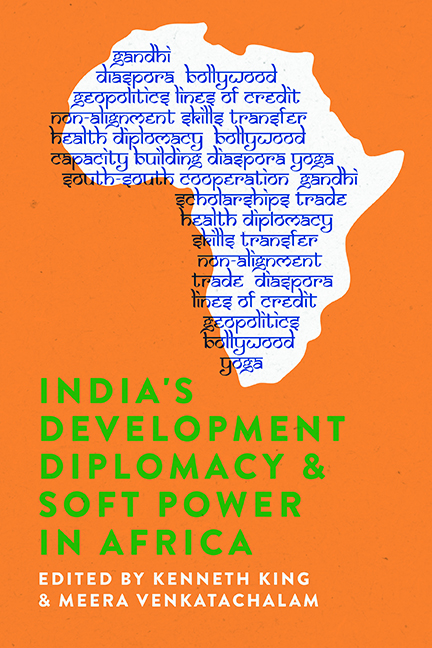Book contents
- Frontmatter
- Contents
- Notes on Contributors
- Acknowledgements
- List of Abbreviations
- Glossary
- Introduction: India–Africa Now: Changing Imaginaries and Knowledge Paradigms
- Part 1 The Geopolitical Imaginary and Soft Power
- Part 2 The Indian Political Right and the Reconfiguration of Soft Power in Africa
- Part 3 Capacity Building: Shifting Modalities and New Knowledgescapes
- Part 4 Skilling, Knowledge Transfer and Indo-African Interactions
- Conclusion: Reflections on India–Africa Studies, Development Cooperation and Soft Power
- Index
2 - Between Business and Balance: India–Japan in Africa vis-à-vis China
Published online by Cambridge University Press: 26 May 2022
- Frontmatter
- Contents
- Notes on Contributors
- Acknowledgements
- List of Abbreviations
- Glossary
- Introduction: India–Africa Now: Changing Imaginaries and Knowledge Paradigms
- Part 1 The Geopolitical Imaginary and Soft Power
- Part 2 The Indian Political Right and the Reconfiguration of Soft Power in Africa
- Part 3 Capacity Building: Shifting Modalities and New Knowledgescapes
- Part 4 Skilling, Knowledge Transfer and Indo-African Interactions
- Conclusion: Reflections on India–Africa Studies, Development Cooperation and Soft Power
- Index
Summary
Introduction
Academic scholarship and dominant knowledge paradigms constructed Africa as being marred with political instability, poverty, disease and the incapacity to govern itself. However, a change in the geopolitical locus from West to East has accorded Africa with primacy and enabled the global system to view the region as a potential hub for trade, business, technological development, infrastructural connectivity and geostrategic interests. Africa today, as a resource centre and an emerging global market, provides opportunities for developed and developing countries such as Japan, China and India to engage and invest for the enhancement of their own foreign policy goals of economic expansion and strategic advancement.
It is in this regard that China has been rapidly increasing its footprints in Africa through trade and investment in ensuring infrastructural and sustainable development. On the other hand, India and Africa have been natural partners for decades. They have engaged through ancient trade routes and cultural exchanges; anti-colonial and nationalist movements; establishing Afro-Asian solidarity especially after the Bandung Conference in 1955; and finally, as developmental partners in the purview of current developments. Japan's keen interest in Africa should also not be discounted, as it is based on sustainable development through aid, infrastructure, technology transfers and innovation. However, while China's attractive and sustained investments in Africa have been allowing it to become Africa's largest trading partner, India and Japan find their interests and initiatives competing with China’s, not only to protect their respective interests but to envision a fine balance in the face of increased Chinese engagement. While Japan and India as like-minded partners advocating a ‘rule-based order’ have successfully upgraded their ‘Comprehensive Economic Partnership’ to a ‘Special Strategic and Global same remains their mutual apprehensions about China's growing regional influence (Chacko and Panda 2019). As China expands its economic and strategic sway in Africa, a changing trend is witnessed in India's and Japan’s engagement with the region which, through a business-oriented partnership, albeit at a planning stage, focuses on economic growth and technological progression, leading to a change in the earlier aid-oriented outlook towards the region.
This chapter highlights the envisioned India–Japan partnership in Africa vis-à-vis China's Africa policy and argues that while India and Japan's policies in Africa are often pitted against China’s, the formers’ interests in the region remain without any conditionalities.
- Type
- Chapter
- Information
- India's Development Diplomacy and Soft Power in Africa , pp. 41 - 56Publisher: Boydell & BrewerPrint publication year: 2021



